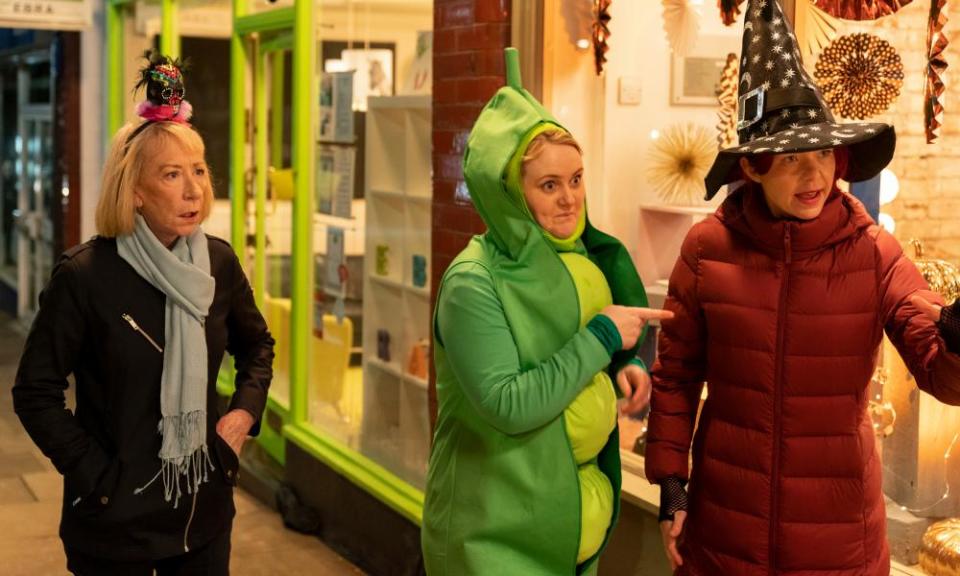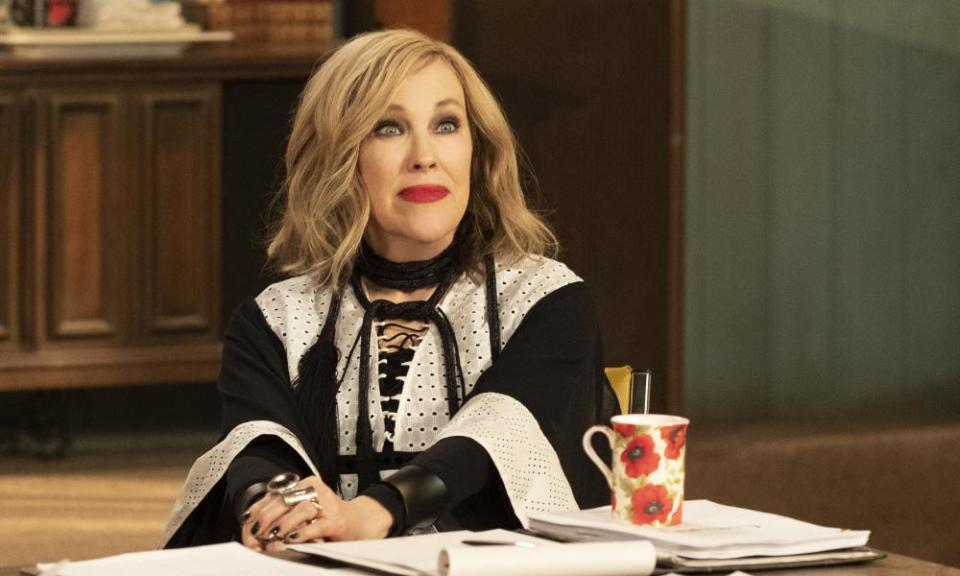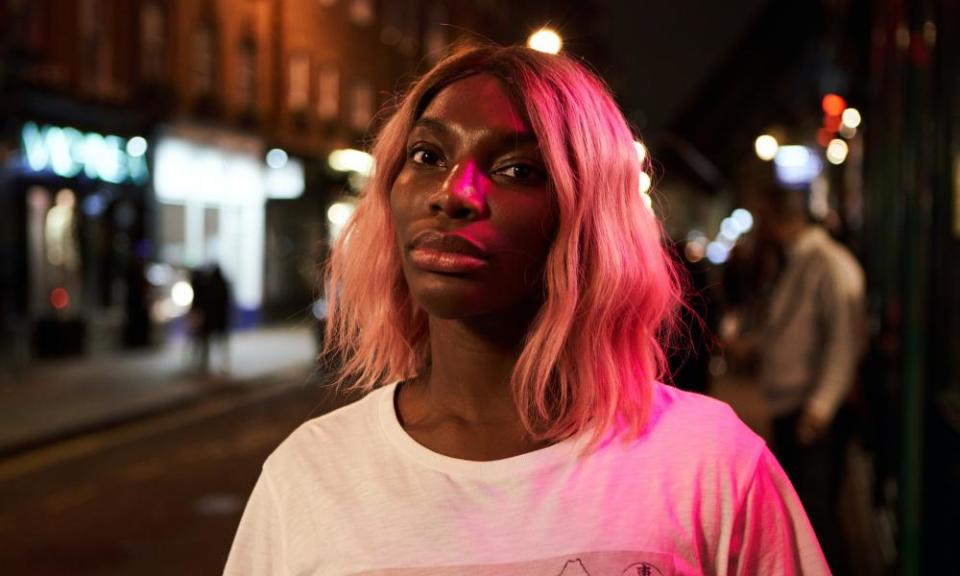‘Cliffhangers should be illegal!’: the most annoying things about TV
No more mix-and-match accents
I understand: making television is hard. Relatable characters, realistic dialogue, actual jokes – these things take huge amounts of effort. What doesn’t take huge amounts of effort is working out which accents to give which characters.
Here’s a general rule: people normally speak with the accent associated with the place they grew up in. Here’s another: characters brought up in the same place tend to have the same accent. Exceptions include: private education; peripatetic childhoods. Exceptions do not include: not being bothered, hoping no one will notice. School dramas tend to be the worst offenders for mix-and-match accents (Sex Education, Waterloo Road), but it’s the subtly incorrect ones that really get to me.

Motherland has vaguely northern Julia (Anna Maxwell Martin) raising a family in London: fine. But how come her mother has a southern accent? Surely that means she grew up round there – or is there some labyrinthine back story? I don’t want to spend time trying to rationalise Julia’s flat vowels, I just want to watch her fail spectacularly at parenting. Careless accent attribution is spoiling shows for nitpickers everywhere: this must end now! Rachel Aroesti
Bad subtitles make you feel like an astronaut
Like most who are hard-of-hearing, one TV gripe reigns supreme for me: rubbish subtitles. That is, if a show even has them. Some don’t, forcing you to clutch hopelessly for meaning, like trying to divine someone’s destiny in tea leaves. When subtitles do exist, they are often filled with inaccuracies. Live captions always lag behind audio, so information reaches you long after an event has happened, as if you are an astronaut on some distant planet. Pre-recorded series often aren’t much better. For some bizarre reason, shows frequently summarise the vague gist of dialogue, not what is actually said. This substandard approach is like giving hearing people a full novel, while deaf viewers are told to make do with SparkNotes. Despite forking out for expensive monthly subscriptions, large swathes of TV are impossible for me to understand. Broadcasters and streaming services, please, I beg you: sort out your subtitles. If I wanted to waste money on something unintelligible, I could have shelled out on a product sold by Gwyneth Paltrow. Josh Salisbury
All those abandoned pints make me shudder
Growing up in a thrifty Asian household, avoiding wastefulness was a way of life. This has continued into my adulthood – so I can’t help but notice, and shudder, when characters on TV sit down to a drink or a meal, then leave it untouched when the action moves on. The full glass of glorious orange juice is a staple of Neighbours, as characters convene at Harold’s Cafe then swiftly exit once they have said their piece. Over at The Queen Vic in EastEnders, I have lost count of the number of crisp pints left untouched. Even on scripted reality shows like Made in Chelsea, glasses of champagne are rarely emptied.
Of course, downing drinks would be a continuity nightmare for the editors – and a bladder-bursting enterprise for actors having to film multiple takes. But I appreciate the steely stomachs of the Friday Night Dinner cast, who would gamely sit down to munch on their meals each episode, making sure their bowls of crumble were always licked clean. That is a form of method acting I can truly get behind. Ammar Kalia
It gets good three seasons in, I swear!

I have lost track of the number of people who have told me: “Schitt’s Creek really comes into its own three seasons in.” I know a series being a full-blown classic from the start is a rare joy, one that demands an awful lot from writers. I know even shows like Seinfeld took a while to get there, that characters like Kramer need to grow then morph and finally burst out of their shells to become TV legends. But isn’t taking multiple seasons to hit your stride asking too much of the viewer? Especially when there are nine million other things to watch.
Yes, pilot episodes are often a blip, stylistically different from the rest. That I can stomach. I can’t be the only one who had to watch The Wire’s initial episode multiple times before I was able to stay awake. There are even those in the “Breaking Bad started badly” camp – though if you weren’t instantly intrigued by Walter White in his Y-fronts failing to shoot himself in the desert, maybe nothing will please you.
Perhaps I should recalibrate my thinking, and see the bad early days of great shows as a test of faith and hope. Clinging on patiently has rewarded me before: Halt and Catch Fire only ignited when it turned its focus on the women, and that’s now one of my favourite shows ever. Likewise The Wire. So come on Moira and Johnny – when I do finally paddle up Schitt’s Creek, please be worth it. Kate Abbott
Where’s the call of nature?

There’s no way of writing this without sounding extremely weird but ... I did enjoy seeing Michaela Coel taking a wee. I May Destroy You broke boundaries around topics such as abuse and consent. But it also smashed another unwritten rule of TV drama: that characters mysteriously never need to pee. I’m not talking about big dramatic scenes like Gigi Cestone conking out on the bog in The Sopranos. More the way screenwriters so often pretend their characters do not experience the call of nature – famously taken to the extreme in 24, where Jack Bauer miraculously never took toilet time-outs.
Come on, you might say: Coel’s masterpiece thrived on gritty realism but nobody needs to see Jon Snow taking a dump. But I’d say … maybe we do?! Let’s have the Raised By Wolves’ humans having a waz on Kepler-22B under extreme gravitational pull. Or Peter Rabbit stopping off during a chase by Mr McGregor to do a series of those strange little pellet poos, maybe even eating them like rabbits seem to enjoy. On second thoughts, this sounds terrible. Maybe Jack Bauer’s bladder exploding would have made for better TV.
Tim Jonze
This should be illegal!
Besides the fact that it aired later and later each night, the recent series of Channel 4’s reality series The Circle was infuriating for one main reason: every episode ended on a cliffhanger – a narrative device which should frankly be illegal. Having to wait 24 hours to find out who was being chucked was torture, even if it did provide more juicy content for my WhatsApp chats than “has anyone been outside lately???”
From Selling Sunset to Made in Chelsea, cliffhangers are everywhere in reality TV. They are a powerful tool, but they should only be used rarely (unless of course the entire series is already available, in which case I absolutely will be pressing next episode 17 times in a row.) As for every other type of show, it’s a firm no. As in life, it’s frankly rude to leave someone hang- Hannah J Davies
Get over yourself, Mad Men
While Mad Men was on TV, there was a running gag that its episode descriptions were increasingly vague. By the show’s penultimate episode – the weird, hazy roadtrip of The Milk and Honey Route – we’re only told: “Don has trouble sleeping. Pete is blindsided by a difficult friend. Facing a new challenge, Henry arranges a family reunion.” That’s all.
I mean, get over yourself. I love Mad Men with all my heart, but it wasn’t easily spoiled. There was no Red Wedding episode. Nobody opened a hatch. It was a show about horrible people being mean to each other while wearing nice suits. And now that the series exists in its entirety, the descriptions make it impossible to cherrypick single episodes. Say I want to watch the one where Don Draper pitches a cereal, drunk. Is that Lost Horizon (“Don receives a reward for his work”)? Or Dark Shadows (“Don becomes competitive”)? No, it’s actually season four’s Waldorf Stories (“Don pitches under unusual circumstances”). And I only know that because I had to Google it. This sort of infinitesimally small inconvenience simply has to cease. Stuart Heritage
Pre-caps make my blood boil
Why oh why must I sit through five minutes of a show I’m about to watch before I watch it? I’ve already tuned in; you’ve got my attention. Australian reality shows, the current rulers of the genre, are the worst offenders. Every episode of Married At First Sight Australia or Australian Survivor makes my blood boil from the off, with their interminable pre-caps. And not only do we get the pre-show preview, but one before and after each non-existent ad break. They’re usually a tissue of lies, too, pretending we’re about to witness some stunning, genre-defining bust-up that never comes. Streaming platforms, for the love of god, please pay someone to edit these out. I’ll do it for you, as a charitable act, so nobody else need suffer as I have while watching Aussies clamour for the crown. Toby Moses
‘CBeebies drives me bananas!’
The beauty of CBeebies is the routine: Collywobble before Clangers, Raa Raa before Yakka Dee. But this predictability makes inconsistencies in the shows more jarring. The best-documented is the lurching perspective of In the Night Garden. Sometimes Makka Pakka appears massive; then, in a flash, he’s breathtakingly tiny, even next to a Tombliboo. When Igglepiggle has a drink inside the Pinky Ponk, it’s palatial. But when it floats past him, it’s little bigger than a pigeon.
This does not ruin the experience – in fact, it can add to its bananas charm. Yet this is not always the case. Topsy and Tim’s memory game (a gamified recap near the end of each episode) is generally a doddle. Very occasionally, it’s impossible, unless you’ve been taking detailed notes. The first time this happens is unnerving. You sit shaking on the sofa, imagining the imminent cognitive decline if Topsy and Tim’s memory game has become too much.
And sometimes, these inconsistencies are impossible to recover from. When Mark Rylance said no to a second series of Bing, David Threlfall was roped in to do his best impression. Yet his Flop is a lobotomised imposter. Rylance’s voice work was, it turns out, the soul of the show. Some chasms can never be bridged. Catherine Shoard
What do you find most annoying about television today? Tell us in the comments below and we’ll share the best

 Yahoo Movies
Yahoo Movies 
